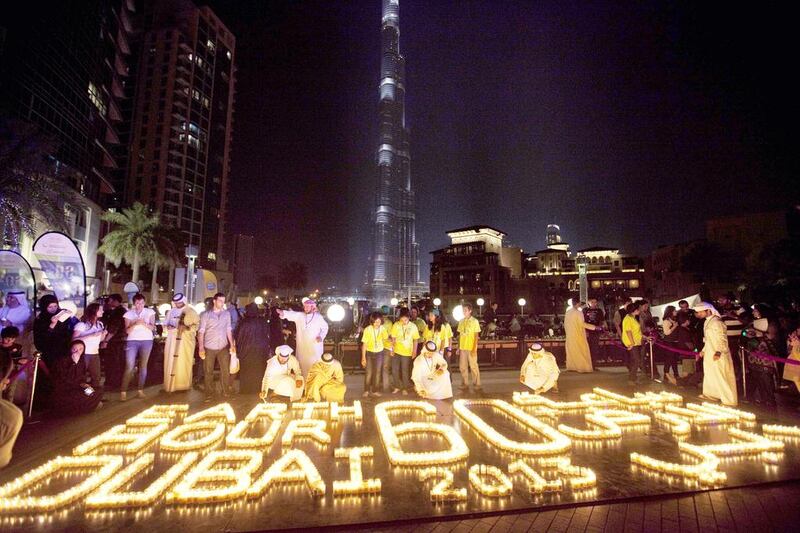DUBAI // Residents across the country are being encouraged to turn off their lights next week to mark Earth Hour.
It is the sixth time the annual event, on March 29, is being held in the UAE and it is hoped that electricity savings could be 10 per cent higher than last year.
Last year, Dubai residents alone saved 200,000kwh by turning off their lights, roughly equal to 120,000 kilograms of carbon emissions.
“The UAE is one of the few countries globally that announces the results of observing Earth Hour,” said Saeed Al Tayer, chief executive of Dubai Electricity and Water Authority.
“This proves the commitment of our leadership to promote environmental sustainability and encourage people to adopt green practices.”
The savings last year were less than those in 2012, which was 216,000kwh, and 130,000kg of carbon emissions – equivalent to Dh1 million.
However, bosses at Dewa hope the savings this year will be as high as 220,000kwh.
To take part in Earth Hour, residents should turn off lights between 8.30pm and 9.30pm. Alternatively, they can join an event from 5pm to 10pm at Bay Avenue Park, Downtown Dubai.
Earth Hour is one of 80 campaigns Dewa ran last year to encourage the public to reduce their energy consumption. The organisation has a target to cut consumption by 30 per cent by 2030.
However, Earth Hour is a global campaign. More than 140 countries, including 7,000 cities and towns around the world, take part in the event every year, which began in Australia in 2007.
“It is inspiring to watch various members of the community in the UAE unite and join the millions of people from all over the world to turn off the lights to prove the effectiveness of Earth Hour every year, to express their desire for real action to protect the planet and to put an end to the phenomenon of climate change,” said Ida Tillisch, director general of Emirates Wildlife Society/WWF.
“In this year, along with the Earth Hour occasion, we invite everyone to take concrete steps by switching to energy-efficient light bulbs, to achieve a sustainable future and circulate a clear message emphasising the need to take responsibility for protecting our planet and future generations.”
Earth Hour is also being used this year to promote the cause of energy-saving light bulbs.
From July 1, the import to the UAE of incandescent light bulbs will be banned, and residents will only be able to buy energy-saving bulbs from shops.
Incandescent bulbs are often sold for Dh1.5, whereas the cheapest halogen energy-efficient bulbs can be up to 10 times more expensive.
However, Ms Tillisch said the costs of replacing bulbs with LED alternatives would be paid back in less than a year.
“The annual savings for a household using LED bulbs is Dh2,300 per year,” she said. “It’s an expense up front but it’s a huge saving for households over the longer term.
“It’s also a huge saving to the government as they currently subsidise energy.”
It is believed that if everyone switched to energy-efficient bulbs, it could save Dh668m a year, cut energy use by 500 megawatts and reduce carbon emissions by 940,000 tonnes – the equivalent of taking 165,000 cars off the road.
Ms Tillisch said that although it was possible the ban could lead to people stockpiling old, incandescent bulbs, it was a better idea to make the switch.
“If they stick to old, incandescent bulbs, they are cheating themselves in the long term,” she said.
mcroucher@thenational.ae





